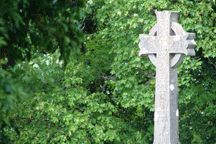In the same way that tides ebb and flow, I’ve learned that my faith life can display the same kind of movement. There are times when God’s grace is surely at “high tide,” and I’m drinking from a fire hose with dreams and synchronicities abounding. Those times are heady and seductive, leaving the “low tide” periods that much more dry and distressing.
As someone who’s struggled with depression off and on throughout my life, those periods of low tide sometimes leave me wondering if God even remembers that I’m here. I’ve often joked with friends that I suspect, at times, that God may have “lost my file,” as if there’s a cabinet with manila folders all neatly labeled with each of our names in permanent Sharpie markers.
I’m just emerging from one of those dark times, and it’s been quite a rough patch. So it surprised even me when I found myself making an impassioned declaration of faith in class the other day.
I had given a presentation where I talked about process theology’s view of Christ as “creative transformation” and Jungian psychology’s journey of “individuation” toward the archetypal Self, highlighting the ways in which I found both systems of thought complementary. I talked about Jung’s idea of the “collective unconscious,” and how it is from this shared unconscious that is both within and beyond our individual psyche that the symbols in dreams emerge, symbols that often have a “numinous” or sacred quality. Many of us who do active dream work know without a doubt that those dreams can be, in the words of Bob Haden, “letters from God.”
A fellow student asked if Jung saw this “collective unconscious” as divine, and if Jung believed in a divine “being” or not. Since Jung tried to limit his discussion to the psychological aspects, it’s not easy to pin him down on that question, but Jung did say to a BBC interviewer that he didn’t believe God exists, he knew God exists. Still, I struggled to clearly answer the question.
But then I said, “look, I don’t know what to say about the collective unconscious, but what I do know is that there’s something bigger than me that loves me.”
That, my friends, was a moment of pure grace. 
In a chapter on “wonder, love, and praise” Bruce Epperly writes in Tending to the Holy that Charles and John Wesley had a “lively sense of grace” and believed that “grace was the first and the last word of Christian experience.” (p. 22)
It was a wonder to me when those words came out of my mouth after the despair I’ve felt in the last year. Yet I think Charles Wesley was on to something when he penned these lines to his hymn “O the Depth of Love Divine”:
Sure and real is the grace, the manner be unknown;
only meet us in thy ways and perfect us in one. L
et us taste the heavenly powers, Lord, we ask for nothing more.
Thine to bless,’ tis only ours to wonder and adore.



